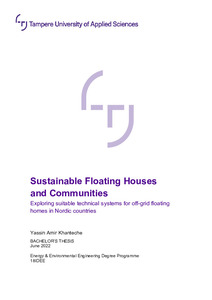Sustainable floating houses and communities : exploring suitable technical systems for off-grid floating homes in Nordic countries
Khanteche, Yassin Amir (2022)
Khanteche, Yassin Amir
2022
All rights reserved. This publication is copyrighted. You may download, display and print it for Your own personal use. Commercial use is prohibited.
Julkaisun pysyvä osoite on
https://urn.fi/URN:NBN:fi:amk-2022061117488
https://urn.fi/URN:NBN:fi:amk-2022061117488
Tiivistelmä
Climate change has had a drastic impact on the demand for sustainable homes, communities, and cities. Numerous strategies and targets have been set by global organizations such as the United Nations (UN), with their Sustainable Development Goals (SDGs), these goals are set to be completed by 2030.
The objective of this thesis is to investigate sustainable floating homes and communities as a potential solution to climate adaptation. Nordic countries were selected due to their leading position in Sustainable Development in European Union and European countries.
The research was carried out using a narrative literature review of various scientific articles and online sources, exploring the technical aspects along with some of the social, economic, and environmental benefits of having these sustainable floating houses and communities.
The findings in this paper identified the most optimal period for utilizing off-grid technical systems such as energy production via solar panels was between May to July due to good weather conditions.
Similarly, other suitable technical solutions for floating homes were identified including Heating, Ventilation, and Air Conditioning (HVAC), water and wastewater treatment methods, waste management, and food production methods.
Sustainable floating homes and communities could play a role in meeting some of the SDGs set by the UN, promoting individual health and wellbeing, developing sustainable businesses, and raising awareness of the need to look after the environment.
The objective of this thesis is to investigate sustainable floating homes and communities as a potential solution to climate adaptation. Nordic countries were selected due to their leading position in Sustainable Development in European Union and European countries.
The research was carried out using a narrative literature review of various scientific articles and online sources, exploring the technical aspects along with some of the social, economic, and environmental benefits of having these sustainable floating houses and communities.
The findings in this paper identified the most optimal period for utilizing off-grid technical systems such as energy production via solar panels was between May to July due to good weather conditions.
Similarly, other suitable technical solutions for floating homes were identified including Heating, Ventilation, and Air Conditioning (HVAC), water and wastewater treatment methods, waste management, and food production methods.
Sustainable floating homes and communities could play a role in meeting some of the SDGs set by the UN, promoting individual health and wellbeing, developing sustainable businesses, and raising awareness of the need to look after the environment.
